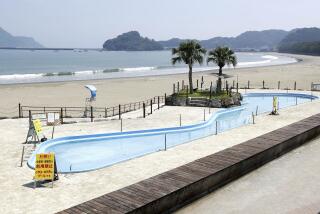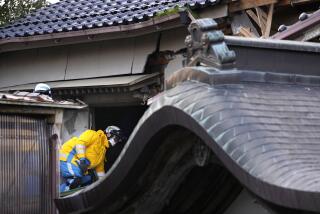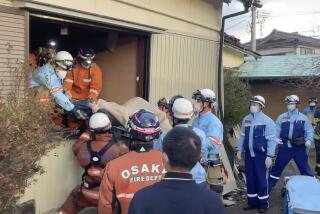Three Found Alive in Quake Rubble
- Share via
TOKYO — Braving unstable ground, rescuers digging frantically with shovels and bare hands found a woman and her two small children alive today in a van that was buried under an avalanche of rock in Saturday’s earthquake in central Japan.
In dramatic images broadcast live on national television, teams pulled away tree branches and wiped mud from the top of the crumpled van.
When they finally reached it, they found the 39-year-old mother, Takako Minagawa, her 2-year-old son, Yuta, and her 3-year-old daughter, Mayu, alive.
Yuta was pulled from the wreckage first, muddy and his clothes torn. But he was conscious as firefighters winched him to safety by helicopter.
Manabu Minagawa, the father of the family, had been in Tokyo, where he works, when the first of a series of quakes hit the Niigata region. He returned to hunt for his family and urged officials to mount a rescue mission.
Firefighters spotted the van’s white paint Monday afternoon, though they could not reach the site for almost 24 hours because of heavy rains and previous boulders.
Before digging, they detected three heartbeats under the rock with listening devices.
They were also slowed by another major aftershock that struck the area today, causing more damage and injuries.
People left homeless by the original, magnitude 6.8 earthquake screamed and threw themselves to the floors of shelters when today’s magnitude 6 temblor hit, rocking damaged buildings.
Five people were reported injured. Kyodo News Service said a woman, 80, was rescued unharmed from the debris of a house that collapsed in Ojiya.
The weekend quake and its aftershocks have killed at least 31 people and injured about 2,500.
The train station in Nagaoka, the largest city in the quake zone, was in danger of collapse, and hundreds of travelers on platforms and passengers on trains were ordered to evacuate, an official at East Japan Railway Co.’s Niigata office said.
The temblor swayed buildings in Tokyo.
More than 100,000 residents remain in shelters, and thousands more are camped out in tents and shelters.
*
Times wire services were used in compiling this report.
More to Read
Sign up for Essential California
The most important California stories and recommendations in your inbox every morning.
You may occasionally receive promotional content from the Los Angeles Times.










